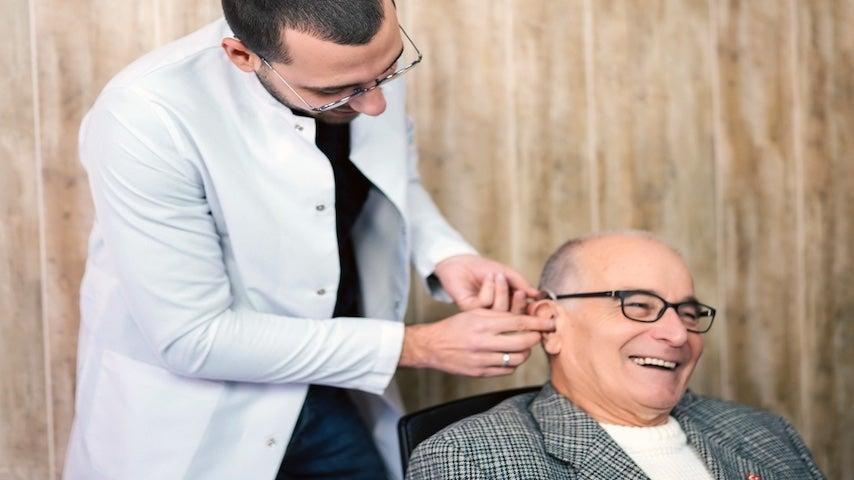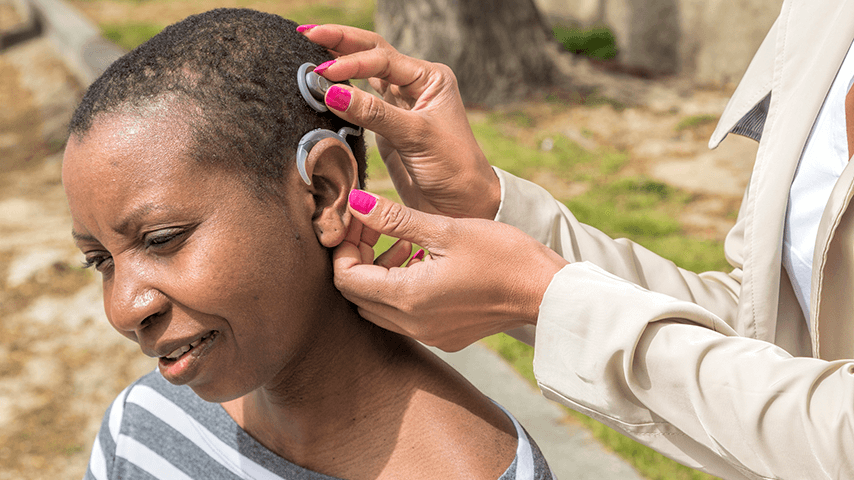
Related Topics
Did you know the average person waits 10 years to get hearing aids once they realize they have hearing loss? This can have a huge impact because untreated hearing loss is linked to greater risks of cognitive decline, dementia, depression, heart disease, and falls.1
But hearing aids can help—using hearing aids actually slowed cognitive decline by as much as 50% in people with hearing loss who were high risk.2 So far, research has shown this benefit only applies to people who are considered “higher risk” for dementia. Either way, the data are clear: The sooner you treat your hearing loss, the better.
For people new to hearing aids, wearing them can be intimidating. Experts tell us there is an adjustment period, but it helps to know what to expect and for how long.
In this article we’ll:
- Explain how to adjust to your new hearing aids
- Share the best tips for keeping your adjustment period short
- Offer guidance on cleaning your new hearing aids to keep them working efficiently
Understand what your hearing aids can do
When you get a new pair of hearing aids, it’s important to understand how to operate them.
If you bought prescription hearing aids, your audiologist or hearing instrument specialist will fit your hearing aids, show you how to operate them, and adjust them if needed. At your first fitting, make sure you are 100% clear on how to operate the hearing aids, including how and when to make adjustments, how to recharge or change the batteries, and how to clean your hearing aids. Feel free to ask the audiologist lots of questions to ensure you are comfortable with your new hearing aids.
If you bought OTC hearing aids, you won’t get in-person support, so it’s important to read the owner’s manual to ensure you know how to use your new hearing aids. Some OTC hearing aid companies, like Jabra, offer virtual support with hearing care professionals. During these virtual sessions, audiologists can remotely adjust your hearing aids to help you hear well.
Most prescription and OTC hearing aids now come with apps letting you adjust things like volume and cycle between pre-set programs meant for hearing better in noisy environments like restaurants.
Start at home
Using hearing aids for the first time can feel odd—your brain has to get used to hearing sounds it hasn’t heard for a long time. And just like returning to exercise after being sedentary, the initial adjustment period is a little uncomfortable. But it should go away quickly.
Experts agree it’s a good idea to get used to your hearing aids by wearing them at home right away—all day. Wearing your hearing aids all day in your normal environment, like your home, can make it easier for your brain to adapt to the new sounds you’re hearing and help build up your tolerance. If you wear them for the first time in a noisy place, like a restaurant, you may feel overwhelmed by all the extra sounds.
Gradually increase your wear time
You should wear your hearing aids at home right away for as long as you can.
“The first two to three days are the most challenging for new hearing aid users as your brain and ears get used to the new sounds,” said Alaina Becker, AuD, a doctor of audiology and owner of Clarity Hearing in Tampa Bay, Florida.
I recommend wearing your hearing aids for at least eight to 10 hours a day during this time to speed up the adjustment process.” —Audiologist Alaina Becker
After you get through the first few days, sounds will start to seem more natural, and you can wear your hearing aids all day long.
“By the end of the first month (the usual adjustment period), most new users are comfortable with their hearing aids and start enjoying better hearing,” said Becker. Try challenging yourself to wear your hearing aids an extra hour each day per week.
While you get used to your new hearing aids, be prepared for some of the following common symptoms:
- Tiredness
- Headaches
- Discomfort
- Sound fatigue (being overwhelmed by the volume of all the sounds you weren’t hearing before)
- Itchy ears
If you need to take a break from your hearing aids due to negative side effects, do so. But tell your audiologist or other hearing care professional so they can help solve the problem. For example, many new hearing aid users report itchy ears, which can usually be fixed by a readjustment.
Challenge yourself
Getting used to new hearing aids can be uncomfortable. But if you stick with it and challenge yourself, you may be able to shorten the adjustment period.
Experts recommend a few different ways to challenge yourself and speed up the adjustment period:3
- Use captions or subtitles while watching TV. This can help with comprehension—because visual cues help your brain process the sound it receives. Reading subtitles helps retrain your brain and improve speech comprehension.
- Have someone with no hearing loss set the volume. Set the TV or other device to a normal volume and train your brain on that sound level. This helps rewire your brain to a new “baseline volume.”
- Practice conversation with family and friends and larger groups. Doing so can help you get used to the sound of your voice and practice identifying different speakers in one group.
- Identify different sounds and where they come from. Feeling overwhelmed by sounds is common for new hearing aid users. Try to consciously pick out each individual sound and identify where it’s coming from. This can help you identify different speakers in a large group or a noisy environment like a restaurant.
Be prepared for frustration
Adjusting to new hearing aids is a process—and it can be frustrating. Allow yourself to feel frustrated and take a break if you need to. Just don’t give up. The most important thing is to keep wearing your hearing aids consistently, even if it means you have to take a few hours off due to a headache or other side effects.
It’s also important to share all feedback with your audiologist or other hearing care professional. Don’t try to muscle through negative side effects—your hearing professional may be able to adjust your hearing aids to solve the problem.
Talk to a friend or family member who successfully uses hearing aids and ask them for pointers on how they adjusted to using their hearing aids. They may have some helpful advice for you.
Talk to your audiologist
If you have prescription hearing aids, be sure to use your audiologist or other hearing care professional as a resource. They can do things like adjust your hearing aids, remove earwax, or recommend different models to help make you feel more comfortable.
If you have OTC hearing aids, you may not have access to an audiologist for adjustments, but some hearing clinics are starting to offer pay-as-you-go services for OTC hearing aid users.
If your hearing aids fit poorly or you feel sudden pain or discomfort, contact your hearing care professional right away.
Learn how to care for your devices
To get the most out of your hearing aids, learn how to care for them. Hearing aids are basically tiny computers in your ears. Like all electronics, they are affected by moisture and humidity.
“Make sure your hearing care provider shows you how to properly clean and care for your hearing aids,” said Becker, the doctor of audiology in Tampa Bay, Florida. “In places with high humidity, like Florida, this is even more important to ensure your hearing aids continue working well.”
Experts recommend a few best practices for caring for your hearing aids, including:4
- Clean your hearing aids daily.
- When you remove your hearing aids at night, wipe them with a dry, soft cloth.
- Never use a dripping wet cloth or chemicals.
- Use the brush provided with your hearing aids to clean the microphone gently.
- Use the wax pick (small wire loop) to clean out your hearing aid receiver daily (the part connecting the speaker of the hearing aid to your ear). Wax buildup in the receiver is the second-most common cause of hearing aid failure, after a dead battery.
- If your hearing aids use disposable batteries, keep the battery door open to preserve power.
- Let your hearing aids dry for a few minutes after cleaning before putting them back in your ear.
- If your hearing aids have rechargeable batteries, recharge them every night, so you have a full charge the next day.
Frequently asked questions
How long does it take your brain to adjust to hearing aids?
It usually takes about one month for your brain to adjust to hearing aids. But you can shorten the adjustment period by following several best practices, like gradually increasing how long you wear your hearing aids.
What is the hardest part of adjusting to hearing aids?
One of the hardest parts of adjusting to hearing aids is sensory overload—because of hearing loss, your brain has been receiving less sound to process, likely for years. When you start hearing these sounds for the first time after many years of not hearing them, your brain can feel overwhelmed by all the new sounds. This is normal. Be sure to be patient with yourself and take your time—it will get better.
What is the best way to get used to hearing aids?
One of the best ways to get used to hearing aids is to be prepared for frustration. There will likely be an uncomfortable adjustment period, but if you stick with it and stay patient with yourself, the side effects will slowly go away. It’s also a good idea to challenge yourself by using captions or subtitles while watching TV, practice conversations with family and friends, and identify different sounds and where they come from.
Sources
1. Johns Hopkins Medicine. The Hidden Risks of Hearing Loss. Found on the internet at https://www.hopkinsmedicine.org/health/wellness-and-prevention/the-hidden-risks-of-hearing-loss
2. National Institute on Aging. Hearing Aids Slow Cognitive Decline in People at High Risk. Sept. 14, 2023. Found on the internet at https://www.nia.nih.gov/news/hearing-aids-slow-cognitive-decline-people-high-risk
3. Cleveland Clinic. Six Tips for Getting Used to Your New Hearing Aids. July 21, 2022. Found on the internet at https://health.clevelandclinic.org/how-to-get-used-to-hearing-aids
4. Johns Hopkins Medicine. Caring for Your Hearing Aids. Found on the internet at https://www.hopkinsmedicine.org/health/conditions-and-diseases/hearing-loss/caring-for-your-hearing-aid




